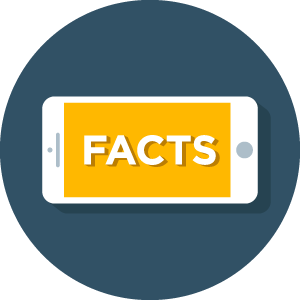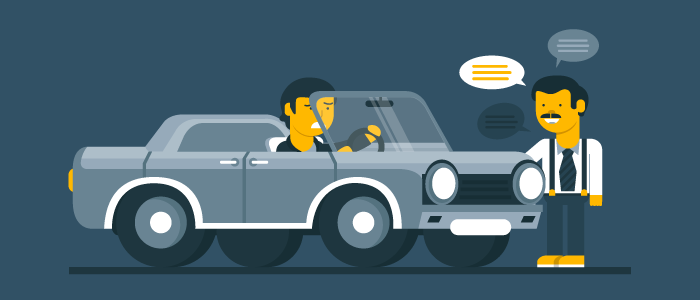Talk to Sales: (401) 200-6026
“How can I earn your business today?” and other clichéd car sales terminology.
If you haven’t said them in real life, you’ve heard them on TV. One of the most identifiable clichés is the car sales terminology used by so many auto sales reps over the years. And the worst part is, at some point in time, they must have worked, or salespeople wouldn’t keep using them. Thankfully, times have changed.
While you’re primarily interested in closing a deal, a customer is mainly interested in knowing that they’ve been given honest, complete information so they can make an informed decision. And one of the first triggers to a customer that a salesperson might be on the shady side is the use of clichéd car sales terminology.
 The caricature of a car salesperson
The caricature of a car salesperson
There are dozens of examples of this, but the first caricature of a car salesperson that comes to mind is from the movie, “Psycho.” Early on, Marion Crane visits a used car lot to trade in her vehicle for a new one as she runs from the police. The moment she arrives on the lot, a dealer approaches her and says, “I’m in no mood for trouble!…There’s an old saying that the first customer of the day is trouble, and like I said, I’m in no mood for it, so I’m just going to treat you fair and square.”
In 1960, a line like that might have worked, though it’s hard to believe. But today that line would send a customer directly out of the dealership door. Part of the reason is that we’ve become too familiar with this car salesperson caricature. However, there is another reason that clichéd car sales terminology doesn’t work anymore.
Patronizing the patrons
 No one likes to be patronized. If someone feels that way, they’re unlikely to take what you have to say seriously, not to mention that they’ll feel insulted. Neither of these consequences makes for a good sales relationship.
No one likes to be patronized. If someone feels that way, they’re unlikely to take what you have to say seriously, not to mention that they’ll feel insulted. Neither of these consequences makes for a good sales relationship.
When car sales first started, it’s possible that car sales terminology could be a bit condescending simply because no one knew any better about the product they were buying. Condescension might have just felt like enthusiasm to the unsuspecting buyer.
But that’s different now. People know more about cars, and if they don’t, they can look up more information online. After years of too many dishonest sales, people are also suspicious of most salespeople, not just car dealers. To use the old car sales terminology on them is to say, to their faces, that they’re still in the dark.
Facts over facetime
 It may also have been that back in the day a certain amount of schmoozing with customers was a part of the sales process. Whether that was or wasn’t the case, it certainly isn’t today. People want facts, they want them upfront, and they want them quickly so they can begin to make a decision. Life is much busier than it used to be, and wasting people’s time with tacky taglines rubs most people the wrong way. Canned statements can come off as cold, rather than personal and welcoming.
It may also have been that back in the day a certain amount of schmoozing with customers was a part of the sales process. Whether that was or wasn’t the case, it certainly isn’t today. People want facts, they want them upfront, and they want them quickly so they can begin to make a decision. Life is much busier than it used to be, and wasting people’s time with tacky taglines rubs most people the wrong way. Canned statements can come off as cold, rather than personal and welcoming.
If you want to win people over, ask them questions and learn their needs. Then explain how the features of a car meet those needs. Don’t rely on campy one-liners to do a job you’re perfectly capable of doing without them. It not only turns would-be customers off, but remember, they’ll probably tell their friends about their experience with you, and it probably won’t be a favorable narrative.
The worst clichés of them all
So what is some of the worst car sales terminology you could use? Consider these beauties. (Then consider forgetting you ever read them.)
“Is saving money important to you?” No, I’d rather spend it all unnecessarily.
“Would you like to know the difference between these two cars?” Would you like to know the difference between receiving a check and receiving nothing?
“What are your needs?” Is this an intervention? How about something more specific?
“If I can lower the price, would you buy?” Not now that I think you could have lowered the price before. (Also, price is rarely the reason someone doesn’t buy.)
And finally, “What keeps you up at night?” These questions. Definitely these questions keep us up at night.
Interested in an Affordable, Full-Featured Auto Dealer CRM?
Schedule an AutoRaptor Demo Now!






